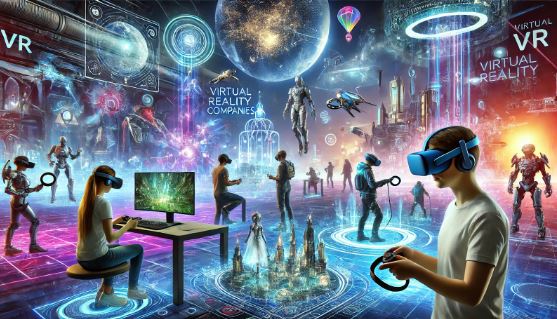How Virtual Reality Companies Are Revolutionizing the Future of Gaming Companies
Virtual Reality (VR) technology has taken the gaming world by storm, creating immersive, interactive experiences that push the boundaries of what was once thought possible. As the technology continues to evolve, virtual reality company playing a crucial role in shaping the future of the gaming industry. From transforming how games are developed and played to opening new possibilities for storytelling and multiplayer experiences, VR is revolutionizing the landscape for gaming companies across the globe.
In this article, we’ll explore how VR is transforming the gaming industry and what the future holds for developers, players, and the technology itself.
The Rise of Virtual Reality in Gaming
Over the last decade, VR has transitioned from a niche technology to a mainstream platform embraced by millions of gamers worldwide. Early VR systems like the Oculus Rift and HTC Vive introduced immersive experiences that allowed players to interact with 3D environments in entirely new ways. However, VR’s true potential is only now being realized, as virtual reality companies continue to innovate, bringing new hardware and software solutions to the table.
The success of devices like the PlayStation VR and Meta Quest has opened the doors for VR gaming to a much wider audience. These platforms have proven that VR isn’t just a gimmick—it’s a transformative technology that allows for a level of engagement and immersion that traditional gaming setups simply can’t match.
How VR Is Revolutionizing Game Development
For gaming companies, VR represents both an opportunity and a challenge. Developing games for VR platforms requires a completely different approach compared to creating traditional PC or console games. From level design and user interfaces to animation and control schemes, VR introduces a new set of development standards.
Creating Immersive Environments
One of the most significant advantages of VR is its ability to immerse players fully in the game world. Virtual reality companies are pushing the limits of graphical fidelity and realism, allowing developers to create hyper-realistic environments where players can walk, interact, and explore. This level of immersion heightens the gaming experience, making players feel as though they’re truly inside the game.
For example, Half-Life: Alyx, developed by Valve, was a groundbreaking VR game that showcased the potential for VR to create fully immersive, story-driven experiences. The success of the game has inspired more gaming companies to invest in VR game development, proving that the technology can be used to create rich, narrative-focused games.
Redefining Game Mechanics
VR introduces new opportunities for innovative game mechanics. In traditional games, players interact with the world through a controller, mouse, or keyboard. In VR, however, the player’s entire body becomes the controller. Whether it’s using hand gestures, full-body movement, or even eye-tracking, VR enables a more natural, intuitive form of interaction.
For instance, in VR games like Beat Saber and Superhot VR, players physically move through space, using their arms, legs, and even their heads to control the game. These mechanics wouldn’t be possible in traditional gaming, and they add a layer of physicality that makes VR gaming both a mental and physical experience.
Pushing Boundaries in Multiplayer Experiences
Multiplayer games are a key part of the gaming ecosystem, and VR is set to change the way players interact in these virtual worlds. Unlike traditional multiplayer games, where players are limited to communicating through voice chat or on-screen avatars, VR allows players to interact in real-time with gestures, body language, and direct communication.
Many virtual reality companies are exploring ways to make multiplayer VR more social and interactive. Games like Rec Room and VRChat have already demonstrated how VR can create virtual spaces where players from around the world can meet, play, and collaborate in real-time. As VR technology improves, we can expect to see even more robust multiplayer experiences that allow players to fully immerse themselves in virtual worlds alongside their friends.
VR and the Future of Storytelling in Games
One of the most exciting aspects of VR is how it’s changing the way stories are told in games. Traditional gaming storytelling methods often rely on cutscenes or dialogue-driven exposition. In VR, players aren’t just passive observers—they’re active participants in the narrative.
This shift in perspective allows for more engaging and interactive storytelling. Players can physically interact with the environment, influence the plot through their decisions, and experience the story as though they’re living it themselves. VR storytelling is about immersion, making players feel like they are a key part of the unfolding events.
Virtual reality companies are experimenting with different ways to push storytelling in VR even further. Developers are exploring how to combine elements of film, theater, and interactive media to create entirely new narrative experiences. This fusion of mediums has the potential to revolutionize how games tell stories, making them more engaging, personal, and impactful.
The Future of VR in Gaming
As VR technology continues to advance, the future looks incredibly promising for gaming companies looking to leverage this cutting-edge technology. Here are some of the ways VR will continue to influence the gaming industry in the coming years:
Improved Hardware and Accessibility
One of the biggest challenges facing VR is the high cost of entry. While devices like the Meta Quest have made VR more affordable, there is still room for improvement in terms of accessibility. However, virtual reality companies are already working on next-generation VR headsets that are not only more affordable but also more powerful, comfortable, and easier to use.
The development of lighter, wireless VR headsets with higher resolution and better motion tracking will make VR gaming more accessible to the average consumer. These advancements will enable gaming companies to reach a broader audience and create more ambitious projects.
Expansion into New Genres
While VR has already proven itself in genres like first-person shooters, puzzle games, and rhythm games, the future will see VR expanding into new and uncharted territory. More traditional game genres, such as role-playing games (RPGs), sports, and strategy games, are already being adapted for VR platforms. As developers experiment with VR in these genres, they will discover new ways to innovate and engage players.
Integration with AI and Machine Learning
Another exciting frontier for VR gaming is the integration of AI and machine learning. As virtual reality companies continue to invest in AI research, we can expect to see more intelligent, responsive NPCs (non-playable characters) in VR games. These characters could learn from the player’s behavior and adapt their responses in real-time, creating more dynamic and personalized gaming experiences.
AI could also be used to improve procedural generation in VR worlds, creating larger, more complex environments that feel alive and unpredictable. This could allow developers to create vast, open-world VR games that remain fresh and engaging even after dozens of hours of playtime.
Conclusion
The gaming industry is on the brink of a VR revolution, and virtual reality companies are leading the charge. From enhancing game development processes to introducing new ways of storytelling and multiplayer experiences, VR is transforming the future of gaming. As the technology continues to advance, it’s only a matter of time before VR becomes a dominant force in the gaming world, offering players experiences that are more immersive, interactive, and emotionally resonant than ever before.
For gaming companies, now is the time to embrace the potential of virtual reality and explore how this transformative technology can shape the next generation of games. Whether it’s through creating immersive worlds, developing innovative mechanics, or redefining storytelling, VR is set to change the way games are made—and how they’re played—for years to come.




